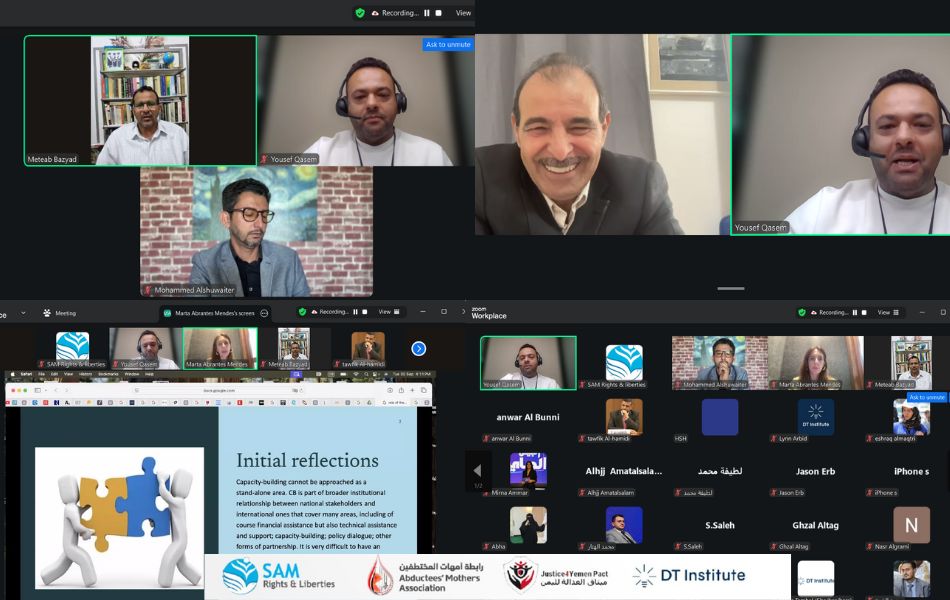
SAM Organization for Rights and Liberties and the Abductees’ Mothers Association concluded the sixth webinar in a series of specialized human rights webinars on transitional justice in Yemen, held under the SPARK project supported by the DT Institute. The event brought together a group of local and international experts, human rights defenders, academics, and representatives of civil society organizations as part of the two organizations’ ongoing efforts to promote human rights awareness and entrench the principles of justice, accountability, and non-impunity.
The webinar opened with a speech by Mr. Tawfiq Al-Humaidi, President of Sam Organization for Rights and Liberties, who emphasized that true justice begins with recognizing the suffering of victims and documenting violations. He stressed that achieving justice requires genuine Yemeni-led efforts driven by civil society, and that the partnership between Sam Organization, the Abductees’ Mothers Association, and the DTI Institute represents an effective model for building a national path for justice based on documentation, accountability, and redress.
In a recorded intervention, international expert Marta Mendez discussed the importance of transitional justice in contexts of prolonged conflict. She noted that awareness of rights and the development of local capacities are the real gateway to any fair transformation, emphasizing that justice must begin before the war ends. Documenting crimes and building collective memory, she added, are the primary guarantees against the recurrence of violations.
Lawyer Anwar Al-Bunni, Director-General of the Syrian Center for Legal Studies and Research, delivered an in-depth presentation on the importance of legal documentation. He underscored that international justice does not start in the courts but with the efforts of victims and civil society in gathering evidence and preserving the truth. He also stressed the need to train qualified Yemeni professionals capable of leading justice processes and pursuing them in the future before national or international courts.
Mr. Mohammed Al-Shuwaiter, Executive Director of the Law Platform, spoke about awareness as the cornerstone of transitional justice. He pointed out that the international community is not a single entity but a collection of diverse actors who must be engaged with strategically and with clear understanding. Al-Shuwaiter added that transitional justice in Yemen requires a nationally owned vision led by human rights defenders and civil society, emphasizing that building a strong legal culture is the key to sustaining this process after the conflict ends.
In the same context, Dr. Mutab Mubarak Bazi, academic, researcher in international law, and President of the Center for Legal Research, discussed the legal dimension of transitional justice. He explained that achieving justice in Yemen requires a fundamental reform of judicial and security institutions and the harmonization of national legislation with international treaties. He stressed that justice is not an obstacle to peace but rather a prerequisite for it, noting that the countries that successfully achieved genuine national reconciliation did so on the basis of acknowledgment of wrongdoing, accountability, and redress.
The final session of the webinar focused on justice from the victims’ perspective, presented by Ms. Omah Al-Salam Al-Hajj, President of the Abductees’ Mothers Association. She affirmed that justice is not a political slogan but a matter of life and dignity. She explained that the mothers began their struggle in front of prisons searching for their sons, and their suffering evolved into an organized human rights movement that documents violations and demands truth and justice for the victims. She called on the international community to fulfill its responsibility in supporting justice and to exert pressure for the release of abductees and an end to their suffering.
Mr. Firas Hamdouni, Yemen Program Director at the DTI Institute, delivered a brief presentation on the outcomes of a recent meeting held by the institute with the Office of the UN Envoy and a number of civil society organizations on transitional justice. He highlighted the need to implement restorative justice initiatives across all Yemeni governorates and stressed the importance of continued international support for these initiatives. He also called for leveraging the economy as a driver for transitional justice programs and prioritizing victims and survivors in development and humanitarian programs.
In conclusion, the webinar stressed that transitional justice in Yemen requires genuine national will and serious cooperation between the state, civil society, and the international community. It affirmed that lasting peace cannot be achieved without justice for victims, reparations, and truth-seeking. The webinar recommended enacting and implementing national legislation that supports transitional justice, establishing an independent national body, strengthening the culture of accountability, documenting violations in line with international standards, and supporting victim- and mothers-led initiatives in all governorates.